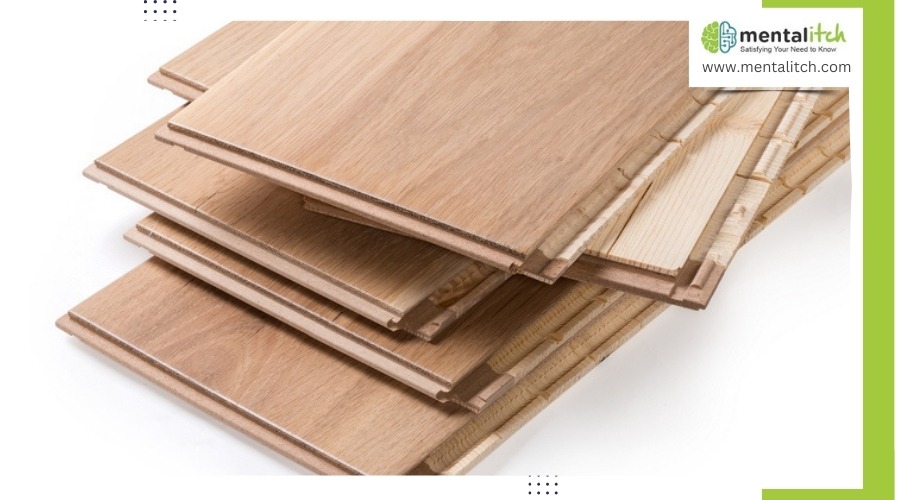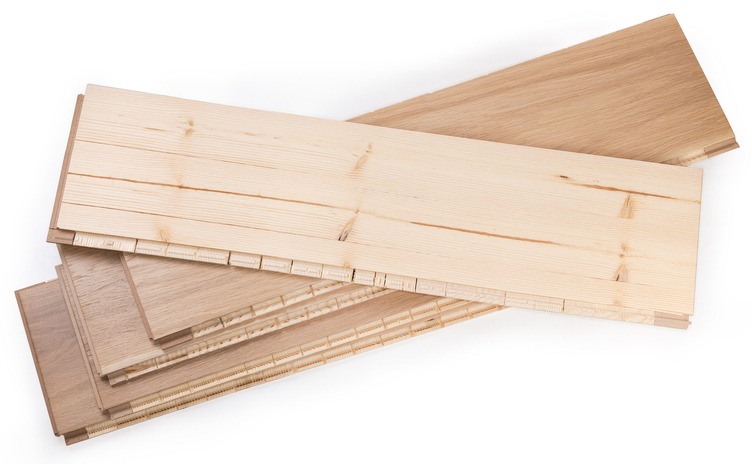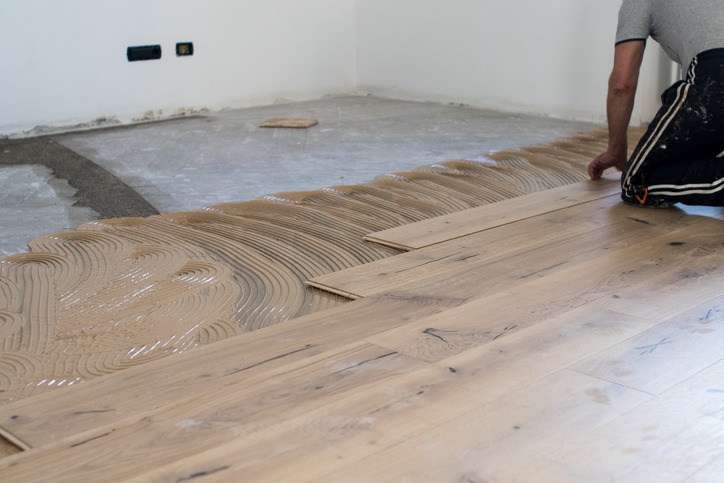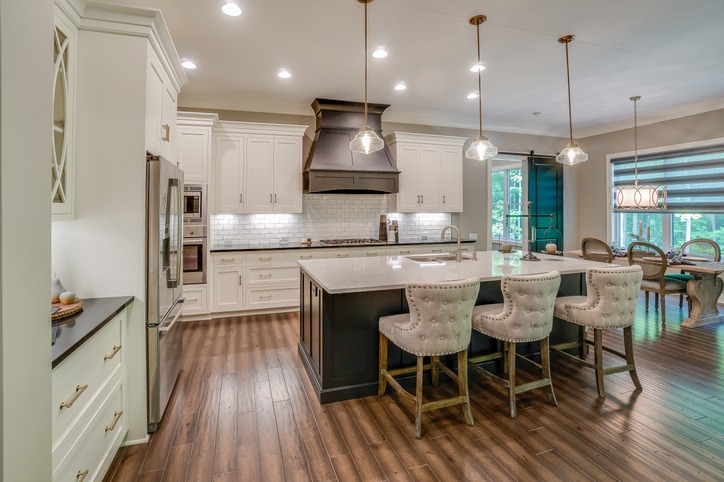In your quest for the perfect floor, you’ve probably stumbled upon engineered hardwood, the flooring industry’s attempt at having its cake and eating it too. Offering the charm of traditional hardwood without the hefty price tag, it’s a tempting option.
But like any decent love story, it’s not without its flaws. You’ve got to wonder about its durability over time and how it stands up to life’s little accidents.
Before you lay down your hard-earned money, let’s peel back the layers of this stylish yet complex flooring option. There’s more beneath the surface, and you’ll want to understand both its shining moments and its shadows.
Understanding Engineered Hardwood
Engineered hardwood combines a solid wood top layer with a plywood core, offering enhanced stability and versatility for your flooring needs. This blend not only provides the aesthetic appeal of wood but also introduces a level of engineered resilience against environmental shifts. With a total thickness ranging from 6.35 mm to 19 mm, and a wear layer that spans 2 to 6 millimeters, this flooring option caters to a broad spectrum of design preferences and practical requirements.
You’ll find engineered hardwood available in a variety of wood species and plank widths, allowing you to tailor your space to your unique style. One of the pros of engineered hardwood is its adaptability to different climates. Unlike solid wood, it’s more stable amidst moisture and temperature changes, making it a suitable choice across various environments. Furthermore, the tongue-and-groove construction simplifies the installation process, offering an achievable DIY project for those with some experience.
However, it’s essential to weigh these pros against the cons. While engineered hardwood provides versatility and stability, the specifics of its construction and material choices can impact its overall performance and aesthetic appeal. Understanding these nuances will help you make an informed decision about incorporating engineered hardwood into your home.
Durability and Resistance
When considering engineered hardwood for your home, it’s crucial to understand its durability and resistance features. You’ll find that its construction offers a shield against moisture and temperature shifts, yet it has its limits in handling scratches, dents, and the potential for moisture damage.
Let’s explore how these factors affect its lifespan and the options for renewing your floors over the years.
Scratch and Dent Resistance
One key advantage of choosing engineered hardwood flooring is its enhanced resistance to scratches and dents, making it a robust option for both homes and commercial settings. This type of flooring stands out as a durable choice, especially in high-traffic areas where the wear and tear of daily life are inevitable.
The secret behind its toughness lies in its construction. Engineered hardwood consists of multiple layers bonded with adhesive, including composite core layers that significantly boost its resistance to impacts. This layered structure not only makes these floors scratch-resistant but also helps in maintaining their aesthetic appeal over time.
Consequently, engineered wood flooring emerges as a long-lasting, durable floor option that effectively withstands the rigors of daily use without compromising on style.
Moisture Damage Risk
While engineered hardwood offers impressive resistance to scratches and dents, it’s also notably more adept at handling moisture and temperature fluctuations than its solid wood counterparts. This resilience significantly decreases the moisture damage risk, especially in environments that pose a challenge for traditional hardwood floors.
- Engineered wood floors are less prone to warping and cupping from moisture.
- Suitable for areas above concrete floors where moisture levels can be higher.
- Compatible with radiant heating systems, mitigating the risk of moisture damage.
- Prompt cleaning of spills is crucial to prevent water damage.
- Regular maintenance enhances resistance against moisture, ensuring durability.
Engineered hardwood’s construction provides a safeguard against the common pitfalls of moisture exposure, making it a reliable choice for various settings without the worry of quick deterioration.
Lifespan and Renewability
Engineered hardwood flooring, with its potential to last up to 50 years, offers both durability and resistance to environmental factors. Your flooring’s lifespan, however, hinges on quality and regular maintenance. By avoiding significant damage to the veneer layer and adhering to proper care practices, you can significantly extend its durability.
Here’s a quick guide:
| Factor | Impact on Lifespan | Note |
|---|---|---|
| Quality | High | Higher quality lasts longer |
| Maintenance | Critical | Regular upkeep is key |
| Environmental Resistance | Good | Tolerant to moisture & temperature |
| Veneer Damage Prevention | Essential | Protects longevity |
Installation Process
Installing engineered hardwood floors offers a DIY-friendly option that can significantly enhance your home’s aesthetic appeal and value. With engineered hardwood flooring, you’re not just investing in a beautiful surface but also embracing a versatile and accessible installation process. This ease of installation, compared to traditional solid wood flooring, means you can transform your space with less downtime and potentially lower installation costs.
Here’s a closer look at what makes the installation process of engineered hardwood so appealing:
- DIY-friendly: Engineered hardwood can be installed as a floating floor, allowing for an easier and quicker DIY project.
- Versatile installation methods: You have the option to glue down or staple the planks, offering flexibility based on your skill level and the specific requirements of your space.
- Compatible with various subfloor types: Whether you have concrete or another type of subfloor, engineered hardwood adapts well, broadening where you can install it.
- Faster installation: The process is typically quicker than installing solid wood floors, reducing the disruption to your daily life.
- Requires a flat, clean subfloor: To ensure longevity and optimal results, starting with a properly prepared subfloor is crucial.
Aesthetic Appeal
After exploring how easy it is to install engineered hardwood floors, let’s consider how they also elevate the look of your home with their aesthetic appeal. Engineered wood planks come in a variety of wood species and plank widths, offering the luxurious look of traditional hardwood. These floors provide the aesthetic appeal of wide-plank wood flooring, enhancing the visual appeal of any space. The top layer of real wood in engineered hardwood creates a luxurious and authentic appearance, designed to mimic the natural beauty of solid wood, adding elegance to any room.
Here’s a quick comparison:
| Feature | Engineered Hardwood | Traditional Hardwood |
|---|---|---|
| Material | Top layer of real wood | Solid wood throughout |
| Variety | Various wood species | Limited by species |
| Width | Wide-plank options | Typically narrower |
| Aesthetic | Mimics natural beauty | Naturally beautiful |
| Price | More affordable | Higher cost |
With engineered hardwood, you can achieve the timeless and stylish look of hardwood flooring at a more affordable price point. This makes it an attractive option for those looking to enhance their home’s aesthetic appeal without breaking the bank.
Environmental Impact
When considering the environmental impact of your flooring choices, you’ll find that engineered hardwood offers several eco-friendly benefits. Unlike traditional solid wood planks, engineered wood flooring is designed with sustainability in mind. It’s not just about having a beautiful floor; it’s also about making choices that are better for our planet.
Here’s how engineered hardwood stands out in terms of environmental impact:
- Reduced waste: The process of creating the veneer for engineered wood flooring significantly cuts down on sawdust waste.
- Faster-growing trees: The species used for engineered flooring replenish more quickly than those used for solid planks, aiding sustainability efforts.
- Less overall waste: Compared to solid hardwood, engineered flooring production results in fewer leftovers, making it a more efficient use of resources.
- Efficient use of materials: Engineered flooring utilizes a greater portion of each tree, minimizing waste and maximizing resource efficiency.
- Supports sustainability: The quick regeneration rate of trees used for engineered wood flooring contributes to a more sustainable flooring industry.
Choosing engineered wood flooring means you’re opting for a product that not only looks good but also has a lower environmental impact compared to traditional solid wood planks.
Maintenance Requirements
While engineered hardwood floors offer significant environmental benefits, they also require specific care to maintain their beauty and longevity. Regular sweeping and the occasional damp mopping are essential maintenance steps to keep them looking their best. It’s crucial that you avoid harsh chemicals and excess water during cleaning, as these can damage your floors.
To prevent scratches and dents, you should place furniture felt pads under all furniture legs. This simple step can significantly reduce the wear and tear your engineered hardwood floors undergo daily. Additionally, using doormats or rugs in high-traffic areas can further protect your floors from unnecessary damage.
Refrain from sanding and refinishing your engineered hardwood flooring too frequently. While these floors can handle some refinishing, doing it too often can wear down the veneer layer, compromising the floor’s durability and appearance. Prevention is your best strategy when it comes to maintaining the quality of your engineered hardwood floors.
Cost Analysis
Delving into the cost analysis, you’ll find that engineered hardwood flooring offers a range of prices from $2 to $18 per square foot, influenced by the quality and brand. This variability means you’ve got options to fit your budget, but there are several factors to consider before making your choice.
- Quality and Brand: Higher-end brands with superior quality materials typically command higher prices.
- Wear Layer Thickness: Floors with thicker wear layers tend to be more expensive, yet they offer better durability and longevity.
- Installation Costs: Depending on whether you opt for DIY or professional installation, your total cost can vary significantly. Professional installation is recommended for the best outcome.
- Maintenance Expenses: Don’t forget to factor in the cost of maintaining your floors to keep them looking great over the years.
- Affordability Compared to Solid Hardwood: Generally, engineered hardwood is more affordable than solid hardwood, making it a cost-effective alternative for many.
Comparing Lifespan
When you’re considering engineered hardwood for your flooring, the lifespan is a crucial factor influenced by durability and maintenance.
You’ll find that with proper care, your floors can last anywhere from 20 to 50 years, depending on their quality.
It’s essential to understand how these factors play a role in extending the life of your investment.
Durability Factors
Engineered hardwood flooring, with its potential to last from 20 to 50 years, hinges significantly on how well you maintain it and avoid major veneer damage. The durability, maintenance, quality, and lifespan of your flooring are tightly interwoven. To paint a clearer picture:
- Durability: High-quality engineered wood withstands daily wear, preserving its appearance.
- Maintenance: Regular care extends the floor’s life, preventing premature replacement.
- Lifespan: Properly maintained, floors can last up to half a century.
- Quality: Investing in premium engineered hardwood ensures longer durability and resistance to damage.
- Avoiding Veneer Damage: Steering clear of deep scratches and dents is crucial for longevity.
Maintenance Requirements
To ensure your engineered hardwood flooring reaches its maximum lifespan of up to 50 years, you’ll need to commit to regular maintenance and care. The longevity of your floors greatly hinges on how well they’re maintained.
High-quality engineered wood, when properly maintained, can last anywhere from 20 to 30 years, and with diligent maintenance, some can even hit the 50-year mark. This longevity largely depends on routine care and avoiding significant veneer damage, which can shorten its life.
Additional Details
- Engineered hardwood flooring is definitely an option to consider!
Conclusion
In conclusion, engineered hardwood offers a stylish and durable flooring option that’s less prone to warping and can withstand heavy traffic, making it a wise choice for various climates. While it’s easier and more versatile to install than traditional wood, it does require some upkeep to maintain its shine and may not last as long as solid wood.
Considering its balance between cost and aesthetic appeal, it’s a compelling option for those seeking the beauty of hardwood without the hefty price tag.




